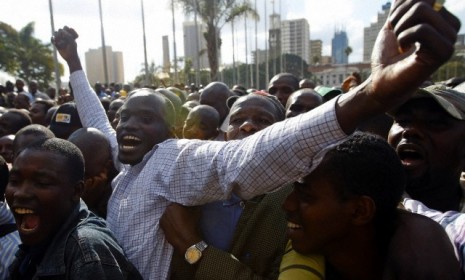How Twitter saved Kenya's election
Social media is playing an increasingly crucial role in letting citizens of developing nations cast their votes without fears of violence

A free daily email with the biggest news stories of the day – and the best features from TheWeek.com
You are now subscribed
Your newsletter sign-up was successful
Once again, social media has played a central role in a national election. During Kenya's recent ballot initiative to adopt a new constitution, citizens used Twitter, along with Facebook and a new breed of monitoring technology, to help eliminate the voter intimidation, bombings, and deadly violence that marred the struggling African country's disastrous 2008 election. Here, a quick guide:
How was social media used to monitor the election?
Voters reported any intimidation issues at the polls by posting Twitter messages with the hashtag #uchaguzi (the Kiswahili word for "election"), or sending SMS messages to a specially designated number. A group of volunteers tracked the messages and alerted local officials when necessary.
The Week
Escape your echo chamber. Get the facts behind the news, plus analysis from multiple perspectives.

Sign up for The Week's Free Newsletters
From our morning news briefing to a weekly Good News Newsletter, get the best of The Week delivered directly to your inbox.
From our morning news briefing to a weekly Good News Newsletter, get the best of The Week delivered directly to your inbox.
Besides Twitter, what other technologies were used?
A Kenyan-developed platform called Uchaguzi helped aggregate all reported problems, documenting incidents by location and type (security issues, hate speech, ballot issues) so that anyone with Internet access could get a quick overview on the Uchaguzi site. It's very new for Kenyans, Uchaguzi's Charles Kithika tells The Christian Science Monitor, to see that problems are being reported and investigated, effectively "discouraging" troublemakers.
What makes Uchaguzi more effective than Twitter alone?
Accessibility and ease of use. "You don't need a user name and password to take part on the Uchaguzi platform," Erik Hersman, creator of Uchaguzi's technology, tells Fast Company. "Anyone with a mobile phone [roughly 50 percent of Kenyans] can send a report into the system, and receive alerts of things happening around them. That's powerful."
A free daily email with the biggest news stories of the day – and the best features from TheWeek.com
So what happened?
Despite intense opposition, Kenyans overwhelmingly and peacefully voted to replace their British colonial-era constitution with a new document, according to preliminary reports. "Kenya has been reborn," Kiraitu Murungi, minister of energy and supporter of the new constitution, tells the Associated Press, after "20 years of painful labor."
Sources: CS Monitor, Sodnet.org, Uchaguzi, Reuters, NY Times, AP, Fast Company
-
 How the FCC’s ‘equal time’ rule works
How the FCC’s ‘equal time’ rule worksIn the Spotlight The law is at the heart of the Colbert-CBS conflict
-
 What is the endgame in the DHS shutdown?
What is the endgame in the DHS shutdown?Today’s Big Question Democrats want to rein in ICE’s immigration crackdown
-
 ‘Poor time management isn’t just an inconvenience’
‘Poor time management isn’t just an inconvenience’Instant Opinion Opinion, comment and editorials of the day